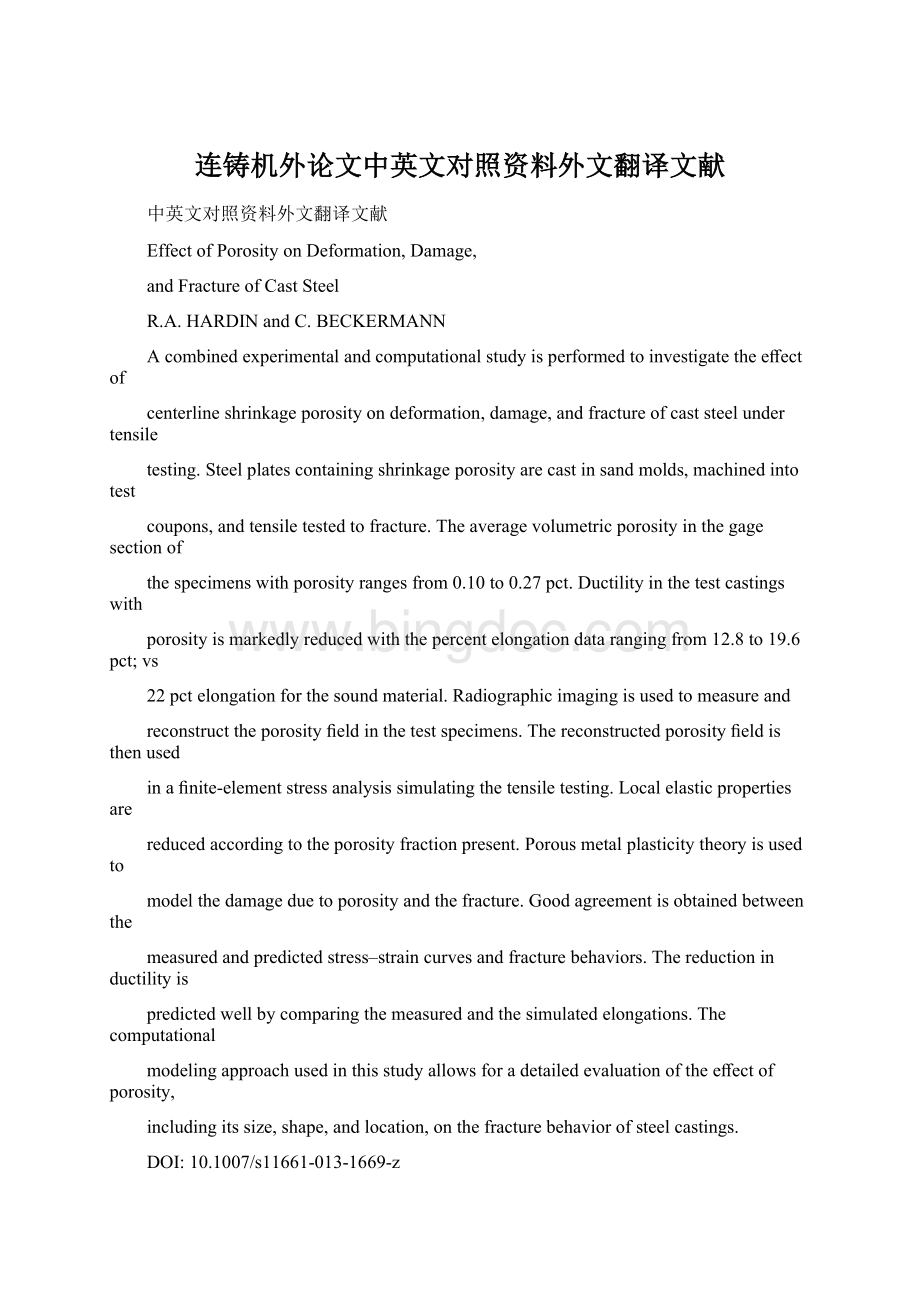连铸机外论文中英文对照资料外文翻译文献.docx
《连铸机外论文中英文对照资料外文翻译文献.docx》由会员分享,可在线阅读,更多相关《连铸机外论文中英文对照资料外文翻译文献.docx(13页珍藏版)》请在冰点文库上搜索。

连铸机外论文中英文对照资料外文翻译文献
中英文对照资料外文翻译文献
EffectofPorosityonDeformation,Damage,
andFractureofCastSteel
R.A.HARDINandC.BECKERMANN
Acombinedexperimentalandcomputationalstudyisperformedtoinvestigatetheeffectof
centerlineshrinkageporosityondeformation,damage,andfractureofcaststeelundertensile
testing.Steelplatescontainingshrinkageporosityarecastinsandmolds,machinedintotest
coupons,andtensiletestedtofracture.Theaveragevolumetricporosityinthegagesectionof
thespecimenswithporosityrangesfrom0.10to0.27pct.Ductilityinthetestcastingswith
porosityismarkedlyreducedwiththepercentelongationdatarangingfrom12.8to19.6pct;vs
22pctelongationforthesoundmaterial.Radiographicimagingisusedtomeasureand
reconstructtheporosityfieldinthetestspecimens.Thereconstructedporosityfieldisthenused
inafinite-elementstressanalysissimulatingthetensiletesting.Localelasticpropertiesare
reducedaccordingtotheporosityfractionpresent.Porousmetalplasticitytheoryisusedto
modelthedamageduetoporosityandthefracture.Goodagreementisobtainedbetweenthe
measuredandpredictedstress–straincurvesandfracturebehaviors.Thereductioninductilityis
predictedwellbycomparingthemeasuredandthesimulatedelongations.Thecomputational
modelingapproachusedinthisstudyallowsforadetailedevaluationoftheeffectofporosity,
includingitssize,shape,andlocation,onthefracturebehaviorofsteelcastings.
DOI:
10.1007/s11661-013-1669-z
TheMinerals,Metals&MaterialsSocietyandASMInternational2013
I.INTRODUCTION
STEELcastingsareunder-utilizedbecauseofuncertaintiesintheirperformanceandlackofexpertiseincastingdesign.Discontinuitiesincastings,likeporosity,playanimportantroleincastingunderutilization.Porositycreatesuncertaintyinadesign’srobustness,sincetherearenomethodologiesforincludingitspresenceinthedesign.Asaresult,designersemployoverlylargesafetyfactorstoensurereliabilityleadingtoheaviercomponentsthannecessary.Contributingtotheissue,theprocessesofdesigningandproducingcastingsareusuallyuncoupledexceptforthespecificationofnondestructiveevaluation(NDE)requirements.Unlessmdesignengineershavetestdataorexperienceforapart,theycallforNDErequirementswithoutknowinghowthisrelatestopartperformance.Bypredictingporosityaccuratelyfromcastingsimulationandrealisticallymodelingitseffectsonthepartperformance,engineerscandeveloprobustdesignsthataretolerantoftheporosityandreliable.Inthecurrentstudy,engineeringapproacheshavebeenappliedtosimulatetheeffectofporosityondeformation,damage,andfractureforacaststeelduringtensiletesting,andthesimulation
resultsarecomparedwithmeasurements.ThematerialusedinthisstudyisASTMA216GradeWCBsteel.Itisacastcarbonsteelhavingacombinationofgoodductilityandstrength.Ithasthefollowingchemicalcomposition(maximumwtpct):
C0.3;Mn1.0;P0.035;S0.035;Si0.6;Cu0.3;Ni0.5;Cr0.5;Mo0.2;andV0.03;andthetotalofCu,Ni,Cr,Mo,andVcannotexceed1.0wtpct.Atroomtemperature,GradeWCBsteelhasayieldstrengthandatensilestrengthof248and485MPa,respectively,and22pctelongationasminimumtensilerequirementsinASTMA216.Failureofsuchductilemetalsoccursonthemicroscopicscalebymechanismsofvoidnucleation,growth,andcoalescence.[1]Voidscanpre-existasmicroporosityandcanalsonucleatefromimperfectionslikesecond-phaseparticles.Afternucleation,voidsgrowwithincreasinghydrostaticstressandlocalplasticstraining.Asvoidsnucleateandgrow,thevoid(orporosity)volumefractionincreases.Thevoidsbegintointeract,andtheporosityfractionatwhichinteractionsbetweenvoidsbeginsisthecriticalporosityvolumefractionfc.Asplasticstraincontinuestoincrease,localneckingandcoalescenceoccurinthematerialbetweenvoidsuntilaconnectedchainofvoidsformsandfailureoccurs.TheporosityfractionatwhichfractureoccursisthefailureporosityvolumefractionfF.Theeffectsofporosityonthestructuralperformanceofcarbonandlowalloysteelcastingsonthemacroscopicscalearenotasclearlydefinedastheyareonthemicroscopicscale.Inpreviousstudies,theeffectsoflargeamountsofporosityonstiffnessandfatiguelifewereinvestigated.[2,3]Porositylessthanafewpercentdoesnotresultinameasurablelossofstiffness,orlargestressconcentrations,orstressredistribution,butitgreatlyaffectsfatigueresistance.[4,5]Also,thepresenceoflow-levelporositywillreducetheductilityofmetalssincemicrovoidspre-existbeforeanystressisappliedandthenucleationstageisbypassed.Porositylargerthanafewpercentinmetalscausesgrosssectionloss,andlocallyreducestheireffectivestiffness.[6–8]Thishigher-levelporosityisnotuniformlydistributedthroughouttheentirecastpart,andthematerialpropertiesinthecastingareheterogeneous.Asaresult,stressredistributionoccursinpartsbecauseofmacropores,andstressconcentrationsoccurnearthem,whichleadtolocalizedplasticdeformationandthedevelopmentofmicrocrackscausingfailure.Generallyspeaking,theperformanceofacastingwithmacroporositydependsontheamount,size,andlocationofporosityrelativetothecastcomponent’sgeometryandloading.Allthesefactorsmustbeconsideredtogether.Determiningtheeffectsoflargelevelsofporosityonpart,performanceistypicallymorecase-by-casedependentthanforlowerlevelsIthasbeenproposedthatthestiffnessandstrengthbehaviorsofporousmaterialscanbecategorizedintothreegroupsbasedonporosityamounts[9]:
lessthan10,10through70pct,andmaterialswithgreaterthan70pct.Thisdivisionispromotedbecausethematerialsattheextremes(<10,and>70pct)behavequitedifferently.Thehighestporositygroupisnotapplicabletocaststeels;thesearefoamsandcellularstructures.Theelastic–plasticbehaviorofporousmaterialsinthe10,through70pctporosityrangeexhibitanonlineardependenceontheamountofporosity[2,6–9]Thebehaviorofmaterialsinthelowestrangedemonstrateamorelineardependenceonporosityamount,assumingthatvoidsdonotinteract[10]andbyconsideringisolatedpores,[11]orauniformdistributionofpores.[12]Applyingtheductilefailuremicromechanicalmechanismsdescribedpreviously,onesuchmicromechanics-basedmodelistheporousmetalplasticitymodel.Itisavailableinthefiniteelementanalysis(FEA)softwareABAQUS.[11–15]Inthemodel,thevolumefractionofporosityisaprimarystatevariable,andtheinelasticflowofthematerialismodeledasvoidsgrowandcoalesceathigherstrainsuntilfailureoccurs.Porousmetalplasticitywasdevelopedassumingvoidsaresphericalandgrowasspheres.Italsoassumesthematerial’splasticbehaviorisdependentonhydrostaticpressurebecauseoftheporosity,andthereforeneglectseffectsofshearstressesonporousmaterialbehavior.Consideringthisandthelimitationsofporousmetalplasticity,therehavebeennumerousdevelopmentsinmodelingofductilefracture[16]]addressingothervoidgeometriesandstressstates.Whilenotstate-of-the-art,porousmetalplasticityisaconstitutivemodelreadilyavailabletodesignersofcastcomponents,andcanbeausefultooltoinvestigatetheeffectofporosityonacasting’sfracturebehavior.Itisacommonconstitutivemodelfoundinmanycommercialfiniteelementpackages.ThisarticleusestheporousmetalplasticitymodelinFEAtopredicttheductilefractureofcaststeelwithcenterlineporosity.Theprimarygoalofthecurrentstudytestswhetherornotthiscommonlyavailablemodelcanpredictthefractureofsteelwithrelativelylargeamountsofporositydetectablethroughtypicalindustrialradiography.Here,castingswithporositywereproduced,madeintoplatespecimens,andradiographed.Theporositywasquantitativelydeterminedfromtheradiographs.Thecastingsunderwenttensiletesting.Usingporositydatafromtheradiographs,finiteelementstressmodelsofthetestspecimenswithporositywerecreated,andthetensiletestingsimulatedusinganelastic–plasticmaterialmodel.Resultsofthesimulatedfracturearecomparedherewiththemeasuredfracturetotestthemodel’scapabilitiesinpredictingthefracturebehaviorofsteelwithcenterlineshrinkageporosity
II.MATERIALPREPARATION,
MEASUREMENT,ANDANALYSIS
A.CastSpecimensandMechanicalTesting
Forthetensilefracturestudypresentedinthisarticle,WCBsteelspecimenswereproducedfrom2.5cmthick912.7cmwideverticallycastplatesoftwolengths(38.1cmand45.7cm)asshowninFigure1(a).TheplatesweredesignedthroughcastingsimulationwithMAGMAsoft
[17]tocontaincenterlineshrinkageasshowninFigures1(b)and(c).Fivecastplateswereproducedandtestedfromthelongerlengthcastings,andfourwereproducedandtestedfortheshorter-lengthcastings.Theletters‘‘D’’and‘‘E’’wereusedtoidentifytheshorterandlongerplates,respectively;followedbynumbers1through5.Thecastplateswerenormalizedandtempered,andmachinedinto19-mm-thicktensiletestcouponswithagagesectionwidthof86mmasshowninthefrontandsideviewsforthespecimeninFigure2(a).ThetensilespecimendimensionsfortheplateswithcenterlineporosityweredeterminedfromtheASTME8tensileteststandard.[18]Thepositioningoftheextensometeronthenarrow/thicknessfaceofthespecimenisindicatedinFigure2(a).InFigure2(b),asmallertensiletestspecimenisshown,whichwasmachinedfromtheporosity-free(or‘‘sound’’)sectionofacastplate.ThespecimenshowninFigure2(b)wastestedtocharacte